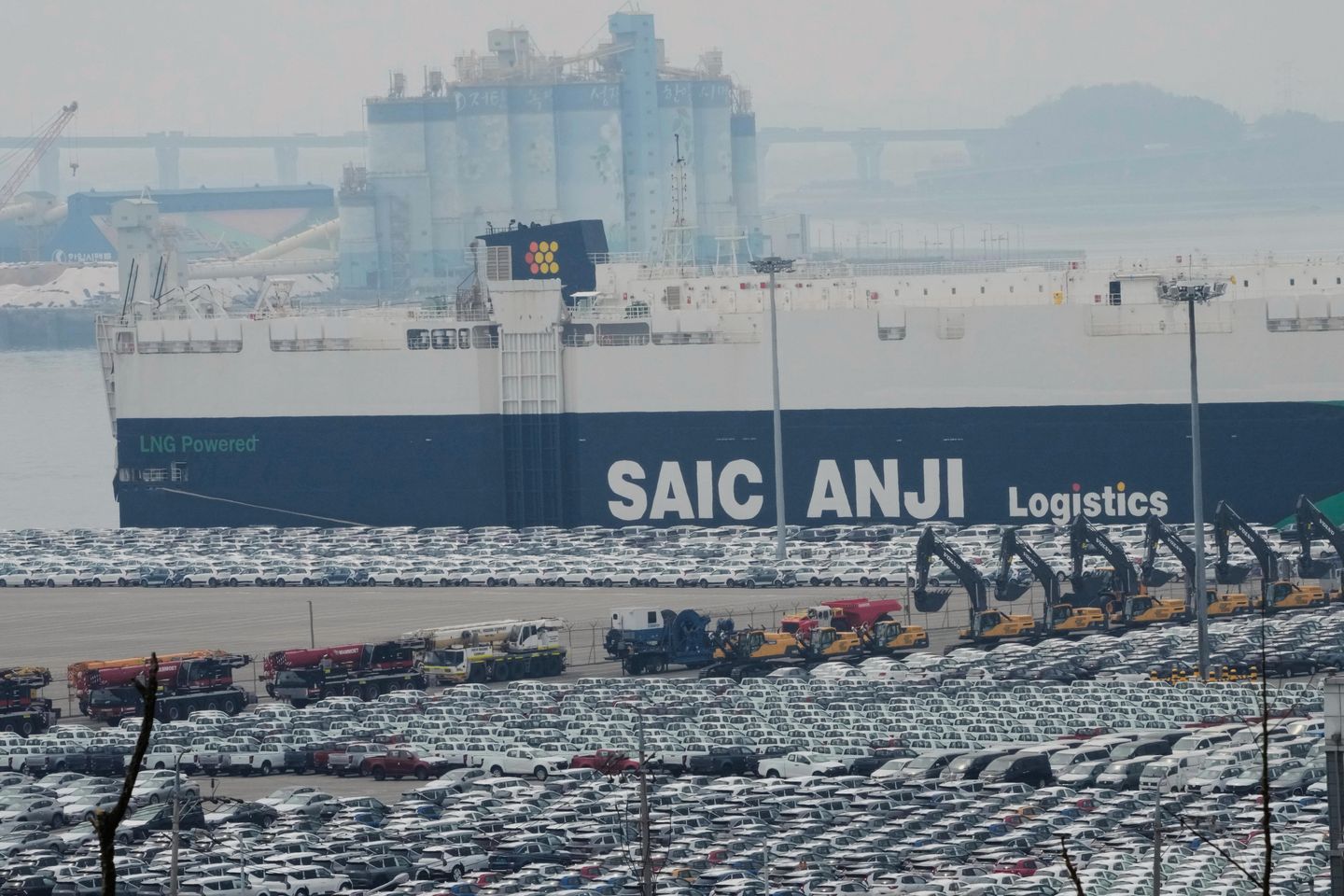
SEOUL, South Korea — As trade chiefs of the 21-member Asia Pacific Economic Cooperation forum met in Jeju, South Korea, on Friday, Seoul requested the negation of tariffs pending from the Trump administration.
Seoul’s Industry Minister Ahn Duk-geun said Friday, after meeting with U.S. Trade Representative Jamieson Greer, that he had asked the U.S. to exempt South Korea. The country faces 25 percent tariffs on key products, to take effect from July 9.
The two agreed to table discussions next week in Washington and to further talks in June.
Japan and Korea, together with Australia, Britain and India, are the five “preferred nations” prioritized by Washington for tariff agreements.
Japan, which also faces 25 percent tariffs, is more confrontational.
Tokyo officials did not attend Jeju and warn that Japan’s massive holding of U.S. debt is a “card” it can play against Washington.
APEC praises WTO
The Jeju meeting precedes the 2025 APEC leaders summit during which VIPs, including Chinese President Xi Jinping and U.S. President Trump, are expected to gather in South Korea in September.
On Friday, the APEC Ministers Responsible for Trade agreed on a joint statement promoting the role of the World Trade Organization in resolving trade problems. Given the furor caused by U.S. tariffs, that may be a safe play.
The world’s supranational body for trade has faltered in recent years. The WTO’s “Uruguay Round” of talks, from 1986-1994, were the largest global trade talks ever, but its “Doha Round” of 2001 never concluded.
Since then, countries and groups of countries have concluded multiple free trade agreements — implicit criticisms of the shortcomings of the global trade regime.
Some in Washington consider the WTO to have hurled open the global economy’s doors to China. In March, it was reported that the Trump administration had frozen U.S. funding for the body.
Bypassing WTO dispute resolution mechanisms for unfair trade, Washington is deploying tariffs on imports to America on a colossal scale. The aims: To win optimal trade terms for the U.S. and to impel inward investment.
The shock tactic has shattered confidence and driven nations and agencies to revise economic outlooks downward.
While attention focuses on the fraught U.S. trade relationship with China, tariffs also impact allies.
Officials in 75 countries who have, per the White House, sought to “address the lack of trade reciprocity in our economic relationships and our resulting national and economic security concerns” are working overtime to gain deals before a 90-day grace period, announced by the White House on April 9, expires on July 9.
Among the countries, industrial powerhouses Japan and South Korea have long histories of multibillion-dollar trade surpluses with the United States.
Negotiations are colored by the fact that both nations are key U.S. security allies; are core nodes in global supply chain; and are major investors and investees with the U.S.
Experts wonder if Trump will actually apply the tariffs, or if they are a huge bluff designed to compel other countries to shift policies.
“Whether he is trying to show some bravado, I think is 50-50,” Kim Yong-jin, a professor of management systems at Seoul’s Sogang University, told foreign reporters. “In all honesty, I think he truly believes that other countries are exploiting the U.S.”
Korea quietly seeks deal
Seoul and Washington’s talks are expected to flesh out a previously discussed “package deal.” Four areas are in focus: tariff and non-tariff measures; economic security; investment cooperation; and currency policies.
There had been hopes in Seoul that Korean shipbuilders’ potential work on U.S. commercial and military shipping, and it corporation’s roles in the mooted Alaska pipeline, could be included. Indications are they will be discussed separately.
South Korea wants tariffs levied on key exports, including chips autos and steel, to be nixed.
South Korea and the U.S. have a bilateral free trade agreement, the KORUS FTA, signed in 2007 and tweaked under the first Trump administration. However, trade imbalances in South Korea’s favor persist.
KORUS means tariffs on U.S. exports to Korea are largely voided. Instead, USTR, which issued its “2025 National Trade Estimate Report on Foreign Trade Barriers” report in April, found 21 non-tariff barriers impede U.S. exporters in Korea.
These include regulations preventing beef from being sourced from cows older than 30 months, regulatory threats to U.S. digital firms and restrictions on Google Maps.
A standout issue is “offset” demands in defense. Under offset, U.S. arms exporters are required to transfer a certain amount of technology to the buyer.
Seoul, in recent years, has benefited massively from its alliance with the U.S.
Thanks to offset; to the adoption of U.S./NATO-standard weaponry; and to its domestic industrial excellence; the country has emerged as a major exporter of tanks, self-propelled artillery and rocketry, and jet trainer aircraft.
Seoul is taking tariffs seriously.
In Jeju Friday, James Kim, chairman and CEO of U.S. business lobby group AMCHAM Korea, said he sensed “good vibes.” He noted that in recent weeks, Korean bodies have been reaching out in a “Buy America” campaign.
On May 8, the Korean Chamber of Commerce and Industry agreed with AMCHAM and GM Korea to promote sales of GM cars, made in Korea, to Korean corporate fleets. On May 15, AMCHAM signed an agreement with the Korean Trade-Investment Promotion Agency to push regulatory reform related to 70 non-tariff barriers identified by AMCHAM.
American negotiators said Korea was “proactive” in talks, Mr. Kim said, implying that “they like what the Koreans are doing, despite the political situation.”
Seoul’s low-key stance on tariffs is necessitated by de facto policy paralysis.
Due to the removal from office of President Yoon Suk Yeol after his martial law declaration last December, the nation is in the midst of a presidential election campaign. A new leader, mandated to make major policy decisions, will be voted in on June 3.
Tokyo talks tough
Tokyo has held three rounds of tariff talks with U.S. negotiators. Unlike Seoul, its response is hardening.
Threatened tariffs on cars — Japan is the world’s top automaker — and on rice — a long-protected agricultural staple — appall Tokyo. Rice is especially sensitive, given Upper House elections in July.
Its response — highly unusual for a nation that customarily conducts negotiations with the U.S. at minimal volume — has been vocal.
“I won’t hesitate at all to ask President Trump in person,” about tariffs, “at the most appropriate time and in the most appropriate format, if necessary,” Prime Minister Shigeru Ishiba said last month.
“We are seriously concerned about whether the tariff measure is consistent with WTO rules and the Japan-U.S. trade agreement,” Economy, Trade and Industry Minister Yoji Muto said, calling the U.S. initiative “extremely unfortunate” and “against our wishes.”
On May 3, Tokyo turned tough.
Finance Minister Katsunobu Kato called Japanese holdings of $1.3 trillion worth of U.S. Treasuries — Tokyo is the world’s largest overseas buyer of the bonds — a “card on the table” in talks.
If Tokyo liquidated a significant portion of those assets, the value of the dollar would weaken, and the U.S. Federal Reserve would likely have to buy bonds, increasing the national debt, which would become more expensive to service.
Tokyo has also been talking up investments made by Japan Inc. in the U.S.: In cumulative terms, it is the largest national investor.
In what may have been a signal, Japan — and fellow APEC members Australia, Canada, Russia and Singapore – did not send a minister to the Jeju trade talks.












